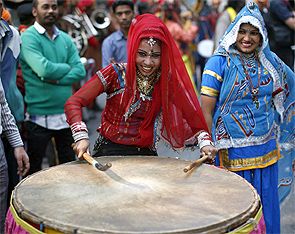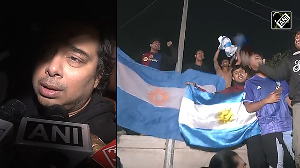 'Pre-election campaigns -- this one particularly -- are always about personalities, never about issues. Bashing one another is the best political parties can do. Or pandering to their constituencies -- religious, caste, economic or whatever.'
'Pre-election campaigns -- this one particularly -- are always about personalities, never about issues. Bashing one another is the best political parties can do. Or pandering to their constituencies -- religious, caste, economic or whatever.'
'Best to enjoy the show without expecting any electrifying performances,' feels Sherna Gandhy.
The choices in Indian elections are usually limited, and often predictable, and the dramatis personae uniformly dull.
Not this year, though. This year, it is a regular three-ring circus.
We have seen stunning acrobatics (of the verbal kind) from one contender as he tries to be all things to all men (women seem to be a little off his radar).
Another, having plodded around the ring docilely in elephant-like fashion for a decade, has decided to stir up his audience by metamorphosing into a young lion ready for the kill. Or attempting to do so, any way.
Most amusing of all, in real life as under the big tent, are the clowns. Intelligent guys who could run rings around everyone else, they deliberately act stupid and are the butt of all jokes. In this case, unintentionally so.
This is a most promising cast of characters because they are so different from each other that they provoke the public and the media to take very strong partisan positions.
The front runner, if we are to believe that other three-ring circus, the media, is the Great New Hope of the Nation, Narendrabhai Modi.
From being the one-dimensional chief minister of Gujarat whose claim to fame, apart from complacently presiding over a communal pogrom (which no one seems to think is important any more) is allowing the Tatas to set up its dinky toy Nano factory in his state and thus earning the tag of being 'business friendly', he has expanded his repertoire and is taking pains to be seen as the man for all seasons.
At one time his speeches were monotonous insults directed at the Gandhi family against who he seemed to be nurturing some deep-seated personal grudge. Even he realised that hate-spewing could carry you just so far. By no means a dummy, Narendrabhai took note of the constant jibes about his being dictatorial and divisive.
Like a nimble gymnast, he began to vary his routine. He 'reached out' (however superficially) to other sections, particularly the community that is his bete noir.
Hence, the endorsements from some Muslim leader in Gujarat and the handshake with the new Syedna in Mumbai.
His verbal callisthenics include claiming he has done wonders for the development (a hugely overworked word that can mean anything) for Gujarat and can do the same for the country.
Not difficult if you give India Inc carte blanche and forget that your constituency is also the aam aadmi (another overworked word of equally indeterminate meaning) and non-Hindus.
Which brings us to the joker in the pack that actually calls itself the Aam Aadmi Party.
Not only has the AAP give the term aam aadmi a new meaning (it once meant the common man a la R K Laxman and now includes the articulate, educated chattering classes as well), Arvind Kejriwal's conquering heroes have also put the traditional political establishment on notice.
For those railing at the immovable, unresponsive monolith that is the political system, the AAP's vigilante tactics have come as a refreshing change.
Several of its ministers who have formed the government in Delhi seem to believe they are living in the days of the Wild West, when justice was quick, summary, and administered without benefit of the law.
In a country where justice eludes most people, such rough and ready methods have many admirers. Who gives a hoot that it is not following proper channels when those channels never deliver?
If the AAP's target was the capital's ministerjis, babus, and wheeler-dealers, I would have stood up and cheered too.
But women? African women? We have enough stereotyping and abusing of women as it is. We don't need Mr Bharti, Delhi's new law minister, to give us a fresh take on the subject. This circus act is not turning out to be as entertaining as we expected.
Which can also be said of the interview given by the third candidate.
How does someone who has everything going for him -- looks, lineage and lucre -- muck up so badly?
A reluctant politician, goaded by his mother and his party into assuming charge, Rahul Gandhi has not made much headway in public esteem in the past decade.
He has tried. Quite sincerely. He is probably a very nice guy and has his heart in the right place. But, somehow, he has completely failed to impress any section of the voting public that he is the right man for the top job.
In the much talked about interview with the media's resident bulldog, Rahul demonstrated that he is not able to think on his feet and is happy to stick with cliches.
Very few Indian political leaders would come out with flying colours in a live interview because they genuinely have nothing to say that would be of any interest to a viewer.
Either they will badmouth the Opposition or harp again and again on the same old 'achievements' of party or self.
Still, one expected better of the youngish man keen to tap the potential of the youth, but seemed totally out of sync with any youthful agenda.
All this sounds like whoever wins, we are in for more of the same. And, of course, that is true, with a little tweaking here and there.
Elections in India don't usher in dramatic changes in areas where dramatic change is really needed.
Change does take pace, but at its usual elephantine speed, and not always in the right direction.
Pre-election campaigns -- this one particularly -- are always about personalities, never about issues.
Bashing one another is the best political parties can do. Or pandering to their constituencies -- religious, caste, economic or whatever -- there are so very many in a country that sometimes forgets it is a country and not a conglomeration of tribes.
Best to just enjoy the show without expecting any electrifying performances.
Image: A performer outside the Bharatiya Janata Party's national headquarters in New Delhi celebrates the BJP's win in the December assembly elections. Photograph: Ahmad Masood/ Reuters










